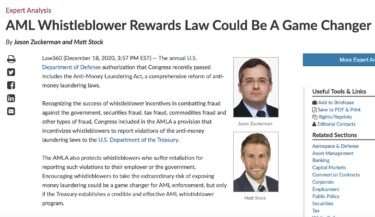Anti-Money Laundering Whistleblower Lawyers
We represent whistleblowers disclosing money laundering and violations of US sanctions under the whistleblower rewards provisions of the Anti-Money Laundering Act. Our AML whistleblower lawyers also represent AML whistleblowers in AML whistleblower retaliation claims and retaliation actions under the Taxpayer First Act and Sarbanes-Oxley Act.
Contact our experienced AML whistleblower lawyers at 202.262.8959.






The anti-retaliation provision of the AMLA affords robust protection to whistleblowers disclosing money laundering, but it does not apply to employees at credit unions and FDIC-insured depository institutions. Those employees can bring retaliation claims under 12 U.S.C. § 1831j or 12 U.S.C. § 1790b.
Section 6314(g) of the AMLA prohibits any employer from retaliating against a whistleblower for:
- providing information in accordance with the AMLA whistleblower program to (i) the Department of the Treasury (Treasury) or the Department of Justice (Justice); (ii) a federal regulatory or law enforcement agency; (iii) any member of Congress or any committee of Congress; or (iv) a person with supervisory authority over the whistleblower, or such other person working for the employer who has the authority to investigate, discover, or terminate misconduct;
- initiating, testifying in, or assisting in any investigation or judicial or administrative action of Treasury or Justice based upon or related to the information that the whistleblower disclosed to the government;
- providing information regarding any conduct that the whistleblower reasonably believes constitutes a violation of any law, rule, or regulation subject to the jurisdiction of Treasury, or a violation of a criminal prohibition against money laundering (18 USC § 1956, 1957, or 1960) to — (i) a person with supervisory authority over the whistleblower at the employer of the whistleblower; or (ii) another individual working for the employer described in clause (i) who the whistleblower reasonably believes has the authority to investigate, discover, or terminate misconduct.
Note the following regarding the scope of protected whistleblowing:
- Internal whistleblowing alone is protected. Moreover, the whistleblower need not meet the AMLA requirements for award eligibility to be protected under the anti-retaliation provision.
- AMLA whistleblower protection is not limited to disclosures of actual BSA violations. Instead, Department of Labor (DOL) and federal court precedent construing similar whistleblower protection laws protect a whistleblower’s reasonable but mistaken belief that the conduct complained of constituted a violation of relevant law. The whistleblower, however, must demonstrate that they had an objectively reasonable belief, which is assessed based on the knowledge available to a reasonable person in the circumstances with the employee’s training and experience.
- Participating in an employer’s internal investigation of a potential BSA violation or reporting a potential BSA violation to a corporate compliance program would be protected under AMLA.
- Although the AMLA’s whistleblower reward provision would apply extraterritorially, the anti-retaliation provision likely would not apply to whistleblowers outside the U.S.
- AMLA whistleblower protection is limited to lawful acts, and therefore a whistleblower should be careful to comply with prohibitions against the unauthorized disclosure of suspicious activity reports (SARs). See, e.g., 31 USC § 5318(g)(2); Financial Crimes Enforcement Network: Confidentiality of Suspicious Activity Reports, 75 Fed. Reg. 75,593 (Dec. 3, 2010).
- Some disclosures protected under the AMLA could also implicate tax fraud, securities fraud, or violations of SEC rules, and therefore whistleblowers should consider preserving retaliation claims under the whistleblower protection provisions of the Taxpayer First Act and Sarbanes-Oxley Act.
The AMLA prohibits a wide range of retaliatory acts, including directly or indirectly discharging, demoting, suspending, threatening, blacklisting, harassing, or in any other manner discriminating against a whistleblower in the terms and conditions of employment due to the employee’s protected whistleblowing.
The catch-all category of retaliation (“in any other manner” discriminating against a whistleblower) includes non-tangible employment actions, such as “outing” a whistleblower in a manner that forces the whistleblower to suffer alienation and isolation from work colleagues. See Menendez v. Halliburton, Inc., ARB Nos. 09-002, -003, ALJ No. 2007- SOX- 5 (ARB Sept. 13, 2011). An employment action can constitute actionable retaliation if it “would deter a reasonable employee from engaging in protected activity.” Id. at 20.
The whistleblower protection provision of the AMLA applies the causation standard and burden-shifting framework set forth in the AIR21 Whistleblower Protection Law. Under that framework, the whistleblower prevails by proving that their protected whistleblowing was a contributing factor in the unfavorable personnel action taken by their employer. The DOL ARB has emphasized that the standard is low and “broad and forgiving”; protected activity need only play some role, and even an “[in]significant” or “[in]substantial” role suffices. Palmer v. Canadian Nat’l R.R., ARB No. 16-035, ALJ No. 2014-FRS-154, at 53 (ARB Sept. 30, 2016). Examples of circumstantial evidence that can establish “contributing factor” causation include:
- temporal proximity;
- the falsity of an employer’s explanation for the adverse action taken;
- inconsistent application of an employer’s policies;
- an employer’s shifting explanations for its actions;
- animus or antagonism toward the whistleblower’s protected activity; and
- a change in the employer’s attitude toward the whistleblower after they engage in protected activity.
Once the whistleblower proves that their protected conduct was a contributing factor in the adverse action, the employer can avoid liability only if it proves by clear and convincing evidence that it would have taken the same adverse action in the absence of the whistleblower engaging in protected conduct.
A prevailing AMLA whistleblower is entitled to the following remedies:
- reinstatement;
- double back pay with interest;
- uncapped compensatory damages, which includes emotional distress damages;
- reasonable attorneys' fees, litigation costs, and expert witness fees; and
- any other appropriate remedy with respect to the conduct that is the subject of the complaint or action.
The statute of limitations for an AMLA whistleblower retaliation claim is 90 days from the date that the employee is first informed of the adverse action.
AMLA retaliation claims must be filed initially with the Occupational Safety and Health Administration (OSHA), which will investigate the claim. If OSHA determines that there is reasonable cause to believe that a violation occurred, it can order relief, including reinstatement of the whistleblower. The whistleblower and the employer can appeal OSHA’s determination by requesting a de novo hearing before the DOL Office of Administrative Law Judges, but an employer’s objection to an order of preliminary relief will not stay the order of reinstatement. Once an AMLA retaliation claim has been pending before the DOL for more than 180 days, the whistleblower can remove the claim to federal court.
An AMLA retaliation claim cannot be brought more than six years after the date on which the violation occurs or more than three years after the date on which when facts material to the right of action become known, or reasonably should have been known, by the employee alleging a violation.
AMLA retaliation claims are exempt from mandatory arbitration.
The AMLA’s whistleblower protection provision does not diminish the rights, privileges, or remedies of any whistleblower under any federal or state law or under any collective bargaining agreement.
AMLA Whistleblower Retaliation Lawyers
Click here to learn more about the Anti-Money Laundering Whistleblower Reward Program. The Director of our Whistleblower Rewards Practice is an attorney, Certified Public Accountant, and Certified Fraud Examiner. To discuss potential representation in an anti-money laundering whistleblower case, click here or call us at (202) 262-8959.
AMLA Whistleblower Reward and Protection Law
Guide to Anti-Money Laundering Act Whistleblower Rewards and Protections



